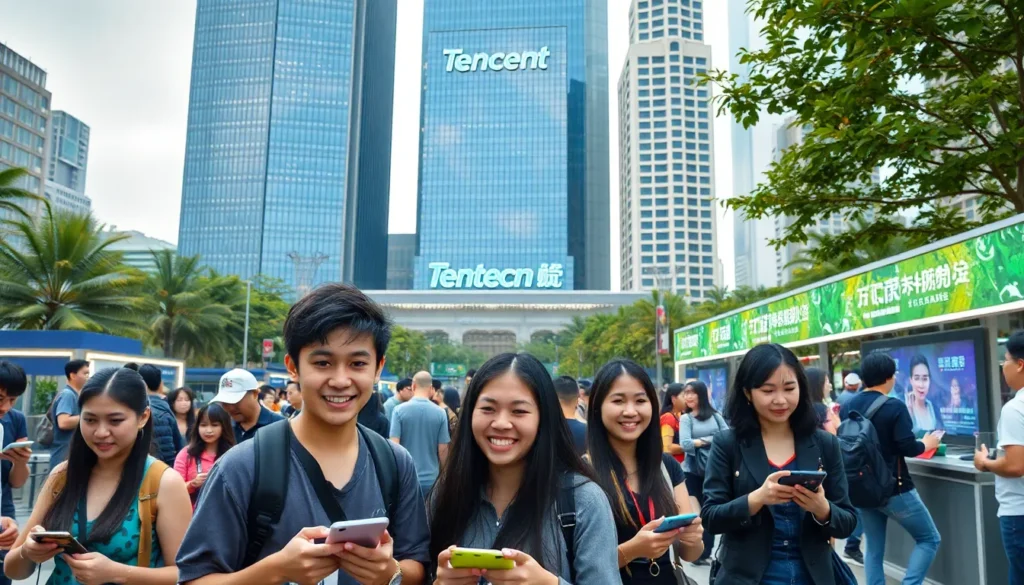Table of Contents
ToggleIn the bustling world of tech giants, Tencent stands out like a neon sign in a dark alley. Founded in 1998, this Chinese conglomerate has transformed the digital landscape, making its mark in gaming, social media, and fintech. With a portfolio that reads like a who’s who of the internet, Tencent’s influence stretches far beyond its home turf, captivating users across the globe.
But hold onto your smartphones—Tencent isn’t just about business. It’s a powerhouse of innovation, blending entertainment and technology in ways that leave competitors scratching their heads. Whether it’s through addictive gaming experiences or the ever-popular WeChat, Tencent knows how to keep users engaged and coming back for more. Dive into the world of Tencent, where the digital future is just a click away, and discover why this titan is more than just a player in the game; it’s redefining the rules.
Overview of Tencent
Tencent, founded in 1998, stands as one of China’s largest technology conglomerates. The company’s core operations include social media, gaming, and fintech services. Its flagship product, WeChat, boasts over 1.2 billion monthly active users, offering messaging, payment, and social networking features. In the gaming industry, Tencent owns stakes in notable companies like Riot Games, creator of League of Legends, and Epic Games, known for Fortnite.
Innovative strategies distinguish Tencent from its competitors. An emphasis on user engagement leads to the integration of social features within gaming platforms. Tencent’s ability to adapt to market trends showcases its agility in the fast-evolving tech landscape. Through strategic partnerships and investments, the firm also extends its influence internationally, reaching markets in Southeast Asia and beyond.
The fintech arm, which includes WeChat Pay, enhances the company’s ecosystem by allowing seamless transactions. Tencent’s diversified portfolio adds layers of resilience to its business model. By investing in artificial intelligence and cloud computing, Tencent positions itself for future growth.
Tencent’s impact goes beyond just technology; it shapes cultural experiences across various demographics. The firm’s commitment to research and development drives innovations that redefine digital interaction. Robust community engagement initiatives reflect the company’s blend of corporate responsibility and business goals.
A comprehensive understanding of Tencent reveals a powerhouse driving significant digital transformation. Each segment of its operations interconnectedly contributes to a broader vision of an integrated digital lifestyle.
History of Tencent

Tencent’s journey began in 1998, when it was founded in Shenzhen, China. This innovative company rapidly established itself as a leader in various digital sectors.
Founding and Early Years
Founded by Ma Huateng and a group of entrepreneurs, Tencent launched its first product, OICQ, in the same year. OICQ, later rebranded as QQ, introduced instant messaging to Chinese users, quickly gaining popularity. This laid the groundwork for Tencent’s development into a tech giant. From the outset, Tencent emphasized communication and social interaction, which became integral to its later growth.
Major Milestones
A series of significant milestones marked Tencent’s evolution since its inception. In 2004, Tencent went public on the Hong Kong Stock Exchange, allowing for expanded investment opportunities. The launch of WeChat in 2011 revolutionized digital communication, boasting over 1.2 billion monthly users by 2023. Strategic acquisitions, including stakes in Riot Games and Epic Games, bolstered its gaming portfolio. By diversifying into fintech with WeChat Pay, Tencent enhanced its service offerings, cementing its impact across multiple sectors.
Tencent’s Business Model
Tencent operates a multifaceted business model that leverages various sectors to generate significant revenue and create a comprehensive digital ecosystem.
Revenue Streams
Tencent generates revenue through diverse channels. Gaming contributes around 33% of the company’s total revenue, driven by titles like Honor of Kings and PUBG Mobile. Social networks, which include WeChat and QQ, form approximately 28% of total earnings, capitalizing on user engagement and advertising. Fintech services, particularly WeChat Pay, add another 15% by offering seamless payment solutions. Online advertising, accounting for about 20%, utilizes Tencent’s vast user data to target advertisements effectively. Each sector’s distinct contributions highlight Tencent’s ability to integrate services, maximizing user interaction and satisfaction.
Key Products and Services
Various key products and services define Tencent’s expansive portfolio. WeChat serves as a multifaceted platform, incorporating messaging, social networking, and payment options, boasting over 1.2 billion monthly users. The gaming division includes popular titles and franchises, like League of Legends, showcasing Tencent’s commitment to immersive experiences. Tencent Cloud provides cloud computing services, supporting businesses with secure infrastructure. Tencent Music offers streaming services, enriching its entertainment ecosystem. Additionally, the company’s investments in artificial intelligence enhance user experiences across platforms, reflecting Tencent’s innovation-driven strategy. Each product and service supports the firm’s overarching aim to redefine digital interactions.
Impact on the Tech Industry
Tencent’s influence on the tech industry is profound and multifaceted. Through its innovations and strategic initiatives, it has reshaped digital interaction and entertainment.
Innovations and Advancements
Innovations define Tencent’s approach to technology and user experience. The company revolutionized how people communicate with WeChat, which integrates messaging, social media, and payment services. R&D initiatives lead to advancements in gaming technologies, enhancing graphics and user engagement within titles like Honor of Kings. Cloud computing services, offered through Tencent Cloud, support businesses with scalable solutions. Artificial intelligence also plays a key role, enhancing content personalization across platforms. With an ongoing commitment to evolving its product offerings, Tencent remains at the forefront of technological advancements.
Competition and Market Position
Market positioning reflects Tencent’s competitive edge in the tech landscape. The company’s diverse portfolio establishes it as a formidable player against rivals such as Alibaba and ByteDance. Strong revenue contributions come from gaming, social networks, and fintech services, securing its financial stability. High engagement rates on platforms like WeChat and QQ foster user loyalty. Strategic acquisitions bolster Tencent’s influence in key markets, particularly in Asia. By continuously adapting to market demands, Tencent maintains its position as a leading global tech powerhouse.
Social Responsibility and Initiatives
Tencent emphasizes social responsibility through various initiatives aimed at enhancing community welfare. The Tencent Charity Foundation plays a crucial role in supporting education, disaster relief, and public health. This foundation collaborates with non-profit organizations to address pressing social issues.
Community development programs target vulnerable populations. Initiatives provide resources and training to low-income families, ensuring access to educational opportunities and skill development. Additionally, Tencent invests in environmental protection projects, focusing on sustainable development and biodiversity conservation.
Digital literacy programs promote awareness and skills in technology among young users. These programs aim to empower youth with the tools needed to navigate the digital landscape safely. Supporting mental health initiatives also contributes to a holistic approach to well-being, with campaigns that raise awareness and provide resources.
Funding for arts and culture strengthens local communities as well. By sponsoring cultural events and supporting artists, Tencent fosters creativity and cultural expression. Collaboration with educational institutions enhances research and innovation, ensuring the advancement of technology-related education.
Efforts to promote responsible gaming practices highlight Tencent’s commitment to user safety. The company implements features that encourage a healthy balance between gaming and daily life. With a focus on preventing gaming addiction, Tencent ensures that players have access to resources for responsible gaming habits.
Engagement with stakeholders is essential for Tencent’s corporate responsibility strategy. Regular consultations with local communities and organizations help align initiatives with societal needs. By integrating social responsibility into its corporate culture, Tencent solidifies its role as a leader in fostering a positive impact.
Tencent stands as a formidable force in the tech industry shaping the future of digital interaction and entertainment. Its diverse portfolio and strategic initiatives demonstrate a commitment to innovation and user engagement. By continuously adapting to market trends and fostering community welfare, Tencent not only enhances its business model but also reinforces its social responsibility.
The company’s ability to integrate various services into cohesive platforms like WeChat showcases its vision for an interconnected digital lifestyle. As Tencent continues to expand its influence globally, its role in redefining the digital landscape remains pivotal. With a focus on technological advancements and community engagement, Tencent is poised to lead the charge into the next era of digital transformation.




